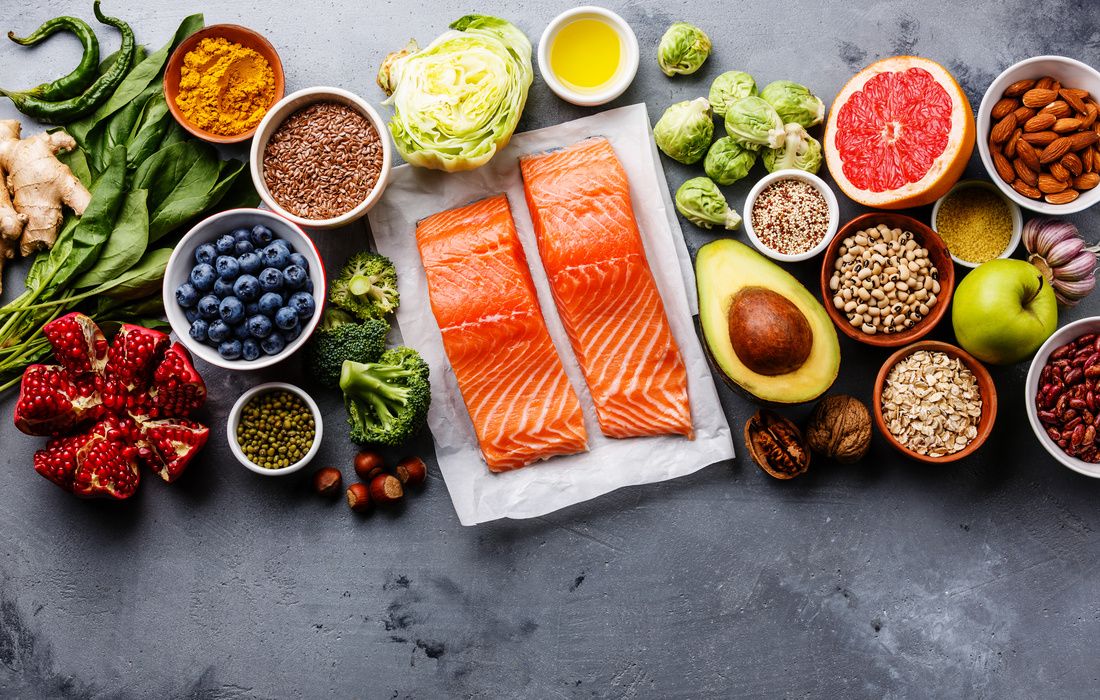Eat a Whole Foods Diet for Longevity and Improved Quality of Life (plus PDF download)
Ali Segersten Jan 07, 2025
Your body is composed of over 30 trillion cells, each of which is continually listening and responding to environmental signals. Embedded in your cellular membranes are tiny antennas—structures that receive information from your inner and outer environment and relay it to your DNA. These biochemical messages shape how your cells behave.
The food you eat is one of the most powerful carriers of this information. With every bite, you’re either turning on anti-aging, disease-preventing, and anti-inflammatory pathways—or activating the pathways that accelerate aging and inflammation.
Let that sink in: Every meal is a message. A conversation between your body and your environment. A chance to shape your future, one choice at a time.
Why Whole Foods Matter
Research shows that more than 80% of chronic diseases are preventable through consistent lifestyle choices such as eating nutrient-dense foods, maintaining a healthy weight, moving your body, and avoiding harmful substances like tobacco. And yet, more than 50% of the calories consumed in the U.S. today come from ultra-processed foods.
Highly processed foods are designed to override your body’s natural signals. They often contain high amounts of refined fat and sugar, combined with flavor enhancers that hijack the brain’s reward pathways. These foods can trigger a surge of dopamine—temporarily boosting pleasure and making it incredibly difficult to stop eating. Over time, this circuitry becomes hardwired.
That’s why the process of transformation takes time. You are literally re-wiring your brain.
But here’s the good news: You can heal this circuitry. Sleep, exercise, alcohol reduction, nutrient repletion, gut healing, and a whole foods diet all help restore balance to your dopamine system, gradually reducing cravings and restoring true appetite regulation.
It’s What You Do Daily That Matters
The most powerful medicine is often found in the mundane.
The food you eat.
The water you drink.
The air you breathe.
The thoughts you think.
These daily choices send signals to your DNA that change how your body functions. The microbes that live in your gut—your second brain—are also deeply influenced by your diet. These microbes produce messages that tell your body how to behave. Feed them well, and you create an anti-inflammatory, healing environment. Feed them poorly, and they generate inflammation, oxidative stress, and disease-promoting signals.
You don’t have to wait for a diagnosis. Since food is something you can control, you can begin reprogramming every cell in your body—starting today—by changing what’s on your plate.
Begin with Whole Foods:
A foundational step for nearly everyone is to remove ultra-processed foods and shift to a whole foods diet. This one change alone can alter the entire trajectory of your health.
The best antidote to a processed food diet is simple. Cook your meals at home using real, unprocessed ingredients. Yes, it takes time and practice, but it’s also one of the most empowering things you can do for your health.
Start with realistic goals.
Plan to cook two or three whole-food-based meals each week, and build from there.
One of the best places to start is breakfast—a meal rooted in high-quality protein, fiber, and healthy fats. A meal like this stabilizes blood sugar, nourishes your nervous system, reduces cravings, and sends healing signals to your cells for the rest of the day.
What’s the Best Diet to Follow?
The best diet is one that feels sustainable, nourishing, and flexible enough to meet your evolving needs. Consider starting with one of these foundational plans:
- Clean Eating Diet – A simple, no-fuss way to eat real food and learn how to prepare meals from scratch.
- IFM Core Food Plan – Developed by functional medicine experts to support lifelong health and balance.
- Mediterranean Diet – A plant-forward plan emphasizing olive oil, legumes, seafood, vegetables, and fresh herbs.
Each of these diets embraces variety, balance, and whole-food ingredients. Whether you lean more plant-based, animal-based, or somewhere in between, the key is to build your meals from unprocessed, nutrient-dense ingredients and learn to listen to what your body needs each day. Lasting change takes time. Start where you are. Choose one manageable step you can begin today.

How to Set Up Your Kitchen for Whole Foods Success:
Transforming your health begins right here—in your kitchen. When you create an environment that’s stocked with real food and free from confusion, you set yourself up for clarity, consistency, and nourishment. Each of these small actions builds momentum. The more prepared your kitchen is, the easier it becomes to make daily choices that support your health, clarity, and long-term vitality. Here’s how to begin (download this as a PDF as well):
Step 1: Clear Out What No Longer Serves You
- Go through your pantry, fridge, and freezer and remove ultra-processed and packaged foods—especially those with refined sugars, additives, and preservatives.
- Toss refined oils like vegetable oil, canola oil, and peanut oil. These promote inflammation and have no place in a healing kitchen.
✨ This is your reset moment—clearing space makes room for real nourishment.
Step 2: Stock Your Pantry with Whole Food Staples
- Purchase whole grains and dried legumes such as black rice, brown rice, quinoa, rolled oats, black beans, chickpeas, and lentils.
- Store them in glass jars to keep them fresh, visible, and ready to use.
- Keep a stash of canned organic beans (black beans, chickpeas, refried beans) for quick, satisfying meals.
- Add minimally processed snacks like organic rice cakes, almond flour crackers, sprouted corn tortillas, and preservative-free dried fruits.
- Choose low-glycemic sweeteners such as coconut sugar and pure maple syrup to replace refined sugar and corn syrup.
Step 3: Build a Healing Spice and Condiment Collection
Create a medicinal spice drawer or cabinet with small jars of organic herbs and spices—these are not just for flavor, but powerful tools for healing.
Start with these foundational spices and their benefits:
- Turmeric – anti-inflammatory, supports liver detoxification, and enhances antioxidant defenses.
- Cinnamon – helps regulate blood sugar and supports digestion.
- Cumin – stimulates bile production and enhances nutrient absorption.
- Ginger – soothes the digestive tract, reduces nausea, and supports immune function.
- Oregano – antimicrobial and antifungal, supports immune health.
- Rosemary – rich in antioxidants, supports cognitive function and circulation.
- Thyme – antimicrobial and respiratory-supportive.
- Coriander – cooling, carminative, and detox-supportive.
- Fennel seed – relieves bloating and supports healthy digestion.
✨ Think of your spice drawer as your everyday apothecary—each jar a source of nourishment and medicine.
Step 4: Stock Your Pantry with Healthy Condiments
Then stock your pantry with the following gut-friendly, flavor-enhancing condiments. These small yet mighty additions can transform a simple dish into a deeply nourishing experience.
- Coconut aminos – a soy-free, lower-sodium alternative to soy sauce.
- Wheat-free tamari – fermented and rich in umami, and gluten-free.
- Raw apple cider vinegar – aids digestion, supports blood sugar balance, and enhances mineral absorption.
- Balsamic, white wine, and brown rice vinegars – add brightness to dressings, sautés, and marinades.
- Dijon mustard – a bold, simple ingredient that elevates sauces and dressings.
These simple ingredients add a big impact to your meals, and make whole food cooking more delicious and exciting.
Step 5: Choose Nourishing Fats
Stock your kitchen with healing, anti-inflammatory fats:
- Extra virgin olive oil
- Avocado oil
- Coconut oil
- Organic butter or ghee
✨ Healthy fats help stabilize blood sugar, support brain function, and keep you full and satisfied.
✨ They’re also essential for building strong, flexible cell membranes—the outer layer of every cell in your body. These membranes are not just structural—they act as intelligent gatekeepers, regulating what comes in and out, and facilitating communication between cells. Without enough high-quality fats, your cells can’t function optimally, and key signals—including those related to hormones, inflammation, and immunity—can become disrupted.
✨ Choosing the right fats nourishes you at the most foundational level—cell by cell.
Step 6: Fill Your Fridge with Freshness
- Keep your refrigerator stocked with seasonal, organic fruits and vegetables—the more colorful, the better.
- Add fermented foods like raw sauerkraut or kimchi for extra gut support.
- Store nuts and seeds (almonds, walnuts, pecans, sunflower, pumpkin, chia, flax) in the fridge to maintain their freshness and nutrient integrity.
Step 7: Fill Your Freezer with Easy, Nourishing Options
- Stock up on organic or pasture-raised meats and poultry, and wild-caught fish.
- Keep frozen organic berries and other fruits for smoothies, baking, or snacking.
- Freeze extra portions of homemade soups, broths, and one-pot meals for easy access on busy days.
Step 8: Create a Weekly Meal Planning Ritual
Once your kitchen is stocked, set aside a little time each week to plan simple meals. This is where consistency starts to take root.
- Choose 2 to 3 core meals to cook and repeat throughout the week.
- Pick one new recipe to try—keep it fun and exploratory.
- Make use of leftovers: soups, stews, and roasted vegetables store well and reduce daily prep.
- If you’re a member, use the Nourishing Meals® Planner to customize your week and generate grocery lists automatically.
✨ Meal planning takes the guesswork out of your day and helps you stay connected to your intention to nourish.
Step 9: Make One Nourishing Meal Today
The most powerful step you can take is the next one.
- Choose one meal to prepare from scratch using whole food ingredients.
- Keep it simple—maybe a hearty lentil soup, roasted veggies with wild salmon, or a protein-rich breakfast hash.
- Light a candle, take a breath, and let this act be your beginning.
✨ Cooking with whole foods is more than a task—it’s a ritual of self-respect, healing, and reconnection.
Let This Be Your Turning Point
Letting go of a food or habit that no longer serves you creates space for vitality, clarity, and healing.
Restoring nourishment is about letting go of what isn't in alignment with your highest self, while also adding in the consistent nourishing practices that will bring about real change. Every time you let go of what isn't serving you anymore, you give yourself the self-love and validation that you are worthy of change.
With each new action, you build momentum on a new trajectory of your life. Real, consistent change takes practice.
With every nourishing meal you prepare, remind yourself:
You are worthy of change.
You are capable of healing.
You are building momentum toward a new trajectory.
You can begin right now by cooking one simple meal from scratch using real, whole food ingredients.
✨ Need guidance? Explore these resources to support your journey:
- Free PDF Download: Nine Simple Steps to a Nourishing Kitchen
- Clean Eating Diet
- Mediterranean Diet
- IFM Core Food Plan
- 12 Gifts of Health—a month-by-month guide to deep, sustainable transformation
- Nourishing Recipes from the Blog
Our membership portal offers meal planning tools and over 1,800 nourishing recipes to support you with dietary change and health transformations.

About the Author
Alissa Segersten, MS, CN
Alissa Segersten, MS, CN, is the founder of Nourishing Meals®, an online meal-planning membership with over 2000 nourishing recipes and tools to support dietary change and better health. As a functional nutritionist, professional recipe developer, and author of The Whole Life Nutrition Cookbook, Nourishing Meals, and co-author of The Elimination Diet, she helps people overcome health challenges through food. A mother of five, Alissa understands the importance of creating nutrient-dense meals for the whole family. Rooted in science and deep nourishment, her work makes healthy eating accessible, empowering thousands to transform their well-being through food.Nourishing Meals Newsletter
Email updates.






Add Comment